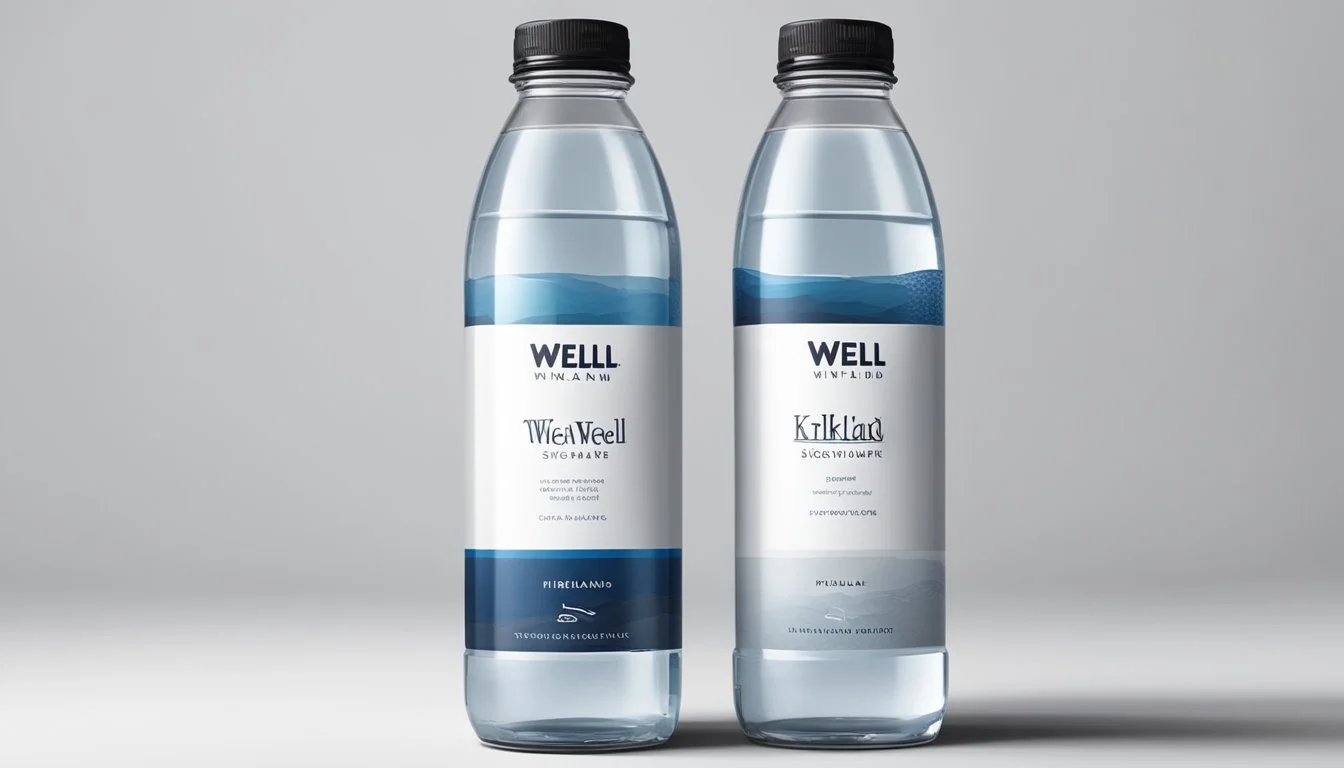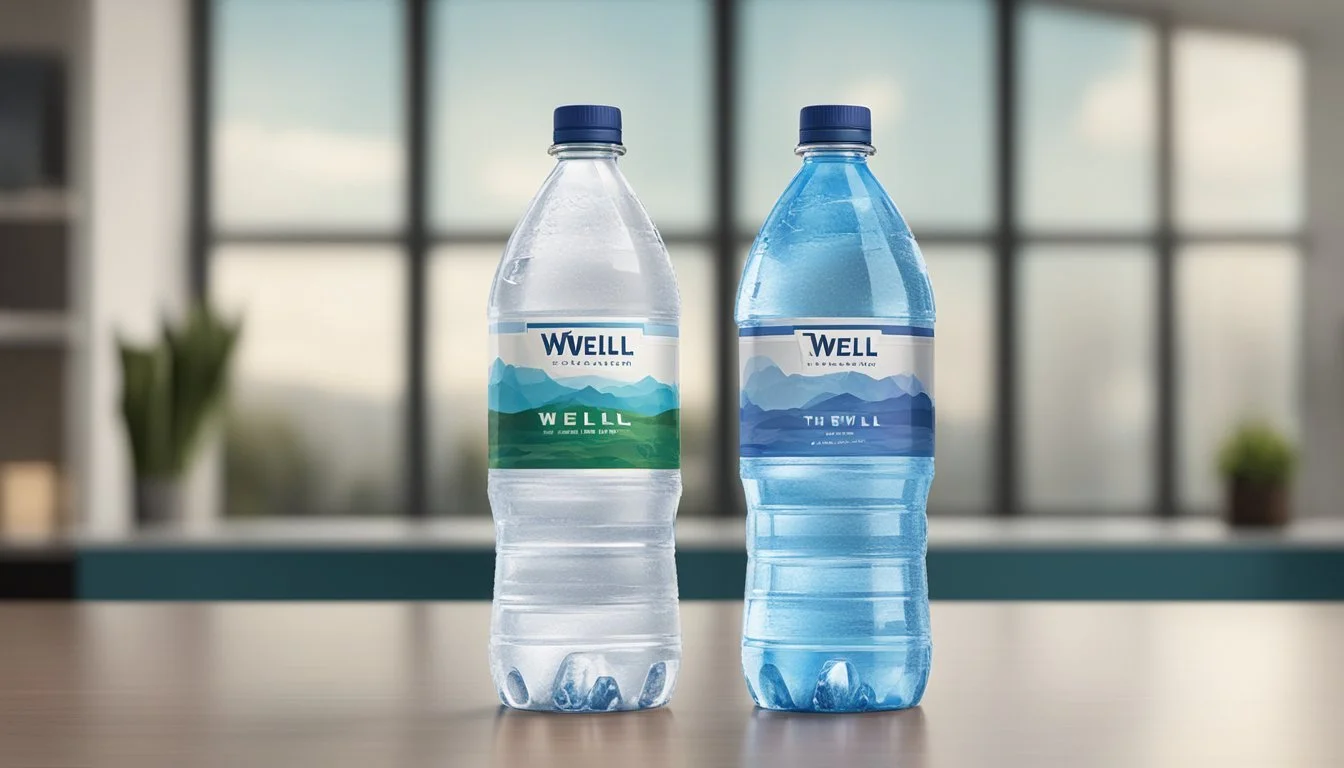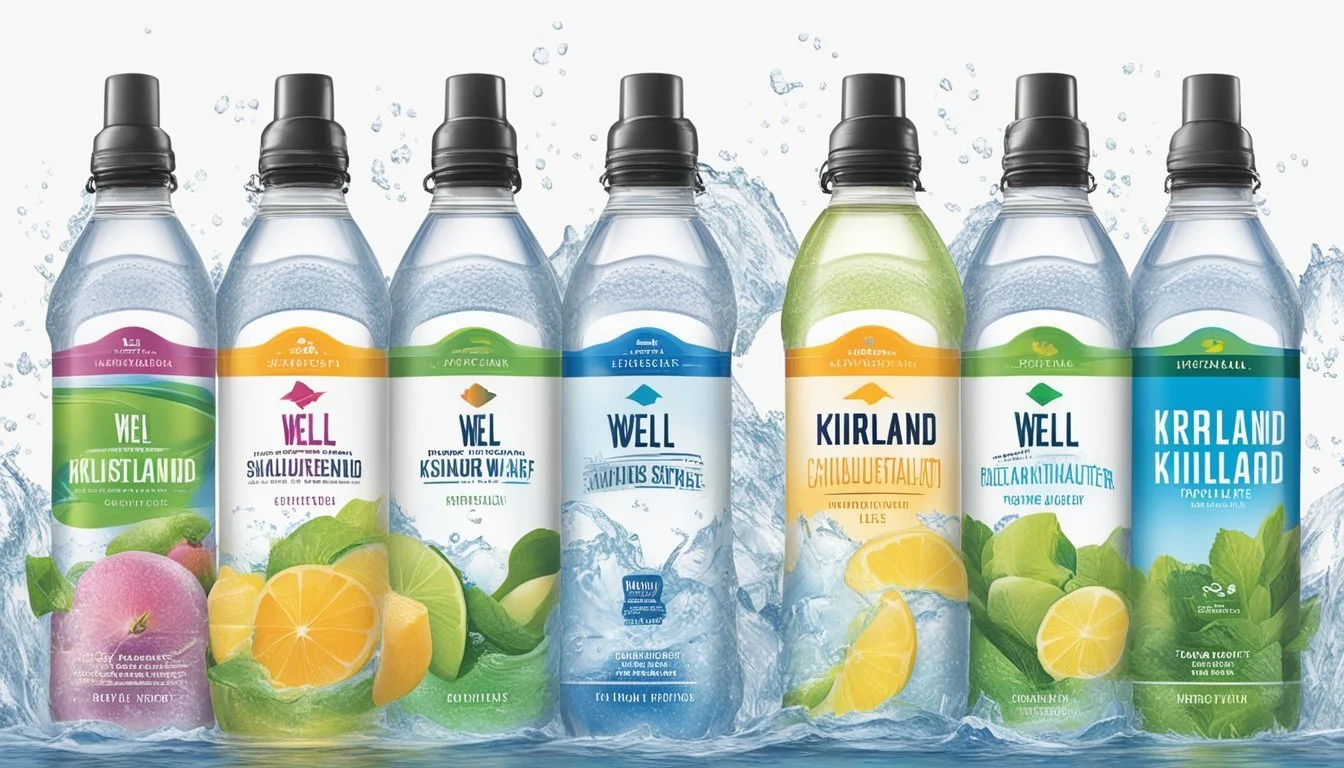The Well vs. Kirkland Signature
Evaluating Bottled Water Quality
When it comes to bottled water, consumers often find themselves navigating a sea of choices, with The Well and Kirkland Signature being prominent options. Both brands cater to the demand for purified and refreshing water, yet they each bring unique attributes to the table. The Well boasts a clean, crisp taste and has built a reputation for purity that appeals to health-conscious customers.
On the other hand, Kirkland Signature, known for its signature purified taste, offers a budget-friendly option without compromising on quality. This brand has consistently delivered reliable hydration, which makes it a favorite among many. Its slight saccharine flavor might not be for everyone, but its affordability and widespread availability give it a competitive edge.
Choosing between The Well and Kirkland Signature will depend on individual priorities, whether it’s the ultra-clean taste of The Well or the cost-effectiveness of Kirkland Signature. Dive deeper into these two popular bottled waters to see which one aligns best with your preferences and needs.
The Bottled Water Industry
The bottled water industry is a crucial segment of the global market, impacting economies and consumer habits. This section provides an overview of market trends and identifies major players in the field, offering insights into how different brands contribute.
Market Overview
The bottled water market continues to expand, driven by increasing consumer demand and health-conscious trends. In the United States, the market value exceeds $18 billion, with a projected annual growth rate of 6.5% through 2028.
Key factors influencing growth:
Health trends
Urbanization
Convenience
The International Bottled Water Association (IBWA) underscores the importance of stringent quality standards and environmental considerations, influencing market dynamics. Grocery stores play a significant role, as they are primary points of sale for various bottled water brands.
Key Players
Several key players dominate the bottled water industry. Leading brands include Dasani, Aquafina, and private labels like Costco's Kirkland Signature and Niagara Bottling.
Dasani: Known for its purification processes and eco-friendly initiatives.
Aquafina: PepsiCo's flagship water brand, popular for its accessibility.
Kirkland Signature: Co-branded with Niagara Bottling, it emphasizes high quality at competitive prices.
Niagara Bottling: A significant private-label producer, family-owned since 1963, contributing to both national and private brands.
These companies uphold rigorous filtration and quality standards, ensuring consumer trust and market stability.
Understanding Bottled Water
Bottled water comes in various types and adheres to strict quality standards to ensure safety and reliability for consumers. Recognizing these types and their quality benchmarks can help in making an informed choice.
Types of Bottled Water
Spring Water: Sourced from natural springs, spring water undergoes minimal processing to retain natural minerals. It is often preferred for its refreshing taste and natural origin.
Purified Water: This type of water has undergone filtration processes like reverse osmosis, distillation, or deionization to remove impurities. Brands like Aquafina and Dasani offer purified water.
Mineral Water: Contains naturally occurring minerals and must come from protected underground sources. Brands such as Evian and San Pellegrino fall into this category.
Sparkling Water: Carbonated water with added CO2 for fizziness. Perrier and LaCroix are popular choices. Sparkling water may also contain minerals, depending on the source.
Alkaline Water: Has a higher pH level than typical tap water, usually above 7. This is achieved through natural or artificial means. Producers claim various health benefits, making it a favorite among wellness enthusiasts.
Enhanced Water: Includes added ingredients such as vitamins, electrolytes, or flavors for added health benefits or taste. Brands like Vitaminwater and Smartwater offer these variants.
Quality Standards
Safety Regulations: Bottled water in the U.S. must comply with the FDA's regulations, ensuring it meets safety standards similar to tap water. Regular testing for contaminants and adherence to labeling requirements are mandatory.
Source Integrity: For types like spring and mineral water, the source must be verified and protected to prevent contamination. This ensures the mineral content and purity remain intact.
Filtration Processes: Purified water goes through rigorous filtration systems to ensure impurity-free water. Reverse osmosis and distillation are common methods used to achieve this.
Additive Monitoring: Enhanced and alkaline waters often contain added minerals and vitamins. Regulatory bodies monitor these additives to ensure they do not exceed safe consumption levels.
Taste and Composition Testing: Regular sensory and compositional evaluations ensure the consistent quality and taste of bottled water. This helps maintain brand reliability and consumer trust.
By understanding these factors, consumers can make more educated choices about the bottled water they purchase, ensuring they select a product that suits their needs and preferences.
Health and Safety Regulations
Both The Well and Kirkland Signature bottled waters must comply with stringent health and safety regulations. These ensure their product is safe to drink and free from harmful contaminants.
FDA and EPA Guidelines
The Food and Drug Administration (FDA) and the Environmental Protection Agency (EPA) set and enforce regulations for bottled water. The FDA oversees bottled water as a food product, ensuring it meets safety standards similar to tap water. The EPA, on the other hand, regulates public drinking water and sets maximum contaminant levels.
Both The Well and Kirkland Signature must comply with these standards. For instance, they are tested for contaminants such as lead, bacteria, and other harmful substances to ensure consumer safety. Additionally, both brands undergo regular monitoring and must provide documentation proving their adherence to safety regulations.
Public Health Considerations
Public health considerations play a crucial role in the bottled water industry. Ensuring that bottled water is safe to drink involves rigorous testing for various contaminants. Brands like The Well and Kirkland Signature are required to meet specific health standards, including the Safe Drinking Water Act regulations.
Consumers are protected through these comprehensive regulations, meaning the water must be free from harmful bacteria, chemicals, and other contaminants. These measures ensure the public can trust the safety and quality of bottled water from both brands, making them reliable choices for daily hydration needs.
Analyzing The Well and Kirkland Signature
The Well and Kirkland Signature bottled water brands have distinct characteristics.
Origin:
The Well sources its water from natural springs.
Kirkland Signature typically uses municipal water sources.
Filtration Process:
Both brands use reverse osmosis for purification.
This process removes impurities, ensuring high water quality.
Mineral Content:
The Well retains natural minerals for a crisp taste.
Kirkland Signature often adds minerals for taste enhancement after filtration.
Taste:
Consumers often describe The Well's taste as clean and refreshing.
Kirkland Signature has a neutral taste, appealing to a broad audience.
Quality Reports:
Kirkland Signature provides detailed quality reports in PDF format, which are accessible to consumers.
The Well also publishes water quality reports, ensuring transparency.
Feature The Well Kirkland Signature Source Natural springs Municipal sources Filtration Reverse osmosis Reverse osmosis Minerals Natural minerals retained Minerals added post-filtration Taste Clean and crisp Neutral and appealing Quality Reports Available online Available online in PDF format
Consumer preferences may vary based on taste and mineral content. Both brands ensure high-quality water through rigorous filtration processes.
Consumer Experience
For consumers, the perception of a brand and the variety of products offered play critical roles in their purchasing decisions for bottled water.
Brand Perceptions
Kirkland Signature, known for its affiliation with Costco, evokes trust among its loyal customer base. Many appreciate its consistency in delivering quality and its affordability. Despite being a private label, Kirkland has carved out a significant space in the bottled water market, comparable with brands like Aquafina and Dasani.
Conversely, The Well markets itself as a premium choice. It emphasizes purity and undergoes rigorous filtration processes. This brand often appeals to health-conscious consumers who prioritize water quality over cost. It positions itself alongside upscale brands like Core Hydration and Smartwater, promoting a sense of luxury and wellness.
Product Range
Kirkland Signature offers a straightforward range of purified and alkaline bottled waters. Typically sold in bulk, it targets everyday hydration needs, keeping offerings simple and practical. This approach resonates well with families and budget-conscious shoppers looking for reliability and value.
The Well, in contrast, boasts a more diversified portfolio. Apart from standard purified water, it provides options enhanced with electrolytes and minerals. This tailored approach caters to specific health needs, aligning closely with brands like Core Hydration. Their variety often enhances their appeal among fitness enthusiasts and individuals seeking a premium hydration experience.
Environmental and Ethical Considerations
Examining both environmental impact and corporate responsibility is crucial when comparing The Well and Kirkland Signature bottled water brands. Key areas of focus include sustainability practices and ethical sourcing.
Sustainability Practices
The Well emphasizes using sustainable materials for its bottles, opting for recycled plastics to reduce waste. Their bottling process is engineered to minimize energy consumption. Moreover, The Well's water sourcing strategy involves selecting renewable water sources that are regularly replenished, ensuring long-term viability.
In contrast, Kirkland Signature places importance on efficient bottle production and recycling programs. Their commitment includes the use of lightweight bottles to lower the carbon footprint associated with transportation. Additionally, Kirkland Signature collaborates with third-party organizations to ensure their water sources remain sustainable.
Corporate Responsibility
The Well's corporate responsibility extends to transparent ethical sourcing. They focus on fair labor practices, ensuring workers receive fair wages and safe working conditions. The company is also committed to community engagement, funding local water projects in underprivileged areas.
Kirkland Signature, owned by Costco, implements broad policies on corporate responsibility. These include strict guidelines on ethical sourcing and comprehensive sustainability goals. The brand invests in community programs and educational initiatives aimed at promoting environmental stewardship and water conservation.
Both brands demonstrate dedication to environmental and ethical considerations, though their approaches and emphases differ. Customers must weigh these factors based on personal values and priorities regarding sustainability and corporate ethics.
Cost Comparison
The cost of bottled water can vary significantly between brands. By examining the price points and the overall value for money of The Well and Kirkland Signature, consumers can make an informed decision about which brand offers better financial benefits.
Price Points
Kirkland Signature, a brand sold by Costco, is renowned for its affordability. Typically, Kirkland water can be found at around $0.10 per bottle when purchased in bulk.
The Well, on the other hand, is priced higher, generally at approximately $1.50 per bottle. This substantial difference in price highlights how The Well may cater to a different market segment compared to Kirkland Signature.
Furthermore, Costco often provides discounts and bulk pricing options for members, making Kirkland Signature a popular choice for cost-conscious consumers.
Value for Money
When evaluating the value for money, it's essential to consider both the cost and the quality of the product. Kirkland Signature's water, sourced from Niagara Bottling, goes through rigorous filtration processes, including carbon filtration and UV filtration.
Despite its low price, it maintains a high standard of purity and taste.
The Well positions itself as a premium brand, and its higher price reflects this. Customers paying for The Well are often seeking the curated experience and unique sources the brand offers.
For cost-conscious consumers, Kirkland Signature's combination of low cost and good quality makes it an excellent value. Conversely, those who prioritize premium branding may find The Well worth the extra expense.
Final Verdict
When comparing The Well and Kirkland Signature bottled water brands, several factors need to be considered to determine the best choice.
Taste and Quality
The Well offers water that is crisp and has a balanced mineral composition. Consumers appreciate its smooth texture and refreshing taste.
Kirkland Signature also provides clean and pleasant-tasting water, sourced from natural springs and purified through a thorough filtration process.
Price and Accessibility
Kirkland Signature is highly cost-effective and widely available, especially at Costco locations. This makes it an easy and convenient option for many.
The Well, while offering premium quality, tends to be more expensive and less accessible compared to Kirkland Signature.
Factor The Well Kirkland Signature Taste Smooth, crisp Clean, pleasant Price Higher More affordable Accessibility Limited Widely available
Environmental Impact
Kirkland Signature uses eco-friendly bottling practices, which include recycled materials.
The Well emphasizes sustainability, often sourcing from less industrialized areas and employing minimal processing methods.
Both brands have strengths and cater to different consumer needs. While The Well excels in premium quality and taste, Kirkland Signature stands out for its affordability and wide availability.
Thus, the best choice between The Well and Kirkland Signature ultimately depends on individual preferences regarding price, taste, and availability.
More About The Well
Cascade Mountain vs The Well: Which Bottled Water is Better?
Hawaiian Springs vs The Well: Which Bottled Water is Better?
Icelandic Glacial vs The Well: Which Bottled Water is Better?
Mountain Valley Spring Water vs The Well: Which Bottled Water is Better?
Nestle Pure Life vs The Well: Which Bottled Water is Better?
Richard's Rainwater vs The Well: Which Bottled Water is Better?
The Well vs Talking Rain AQA: Which Bottled Water is Better?
Whole Foods Italian Still Mineral water vs The Well: Which Bottled Water is Better?
More About Kirkland Signature
1907water vs Kirkland Signature: Which Bottled Water is Better?
7-Select vs Kirkland Signature: Which Bottled Water is Better?
Acqua Pana vs Kirkland Signature: Which Bottled Water is Better?
Alkaline88 vs Kirkland Signature: Which Bottled Water is Better?
Antipodes vs Kirkland Signature: Which Bottled Water is Better?
Aqua Carpatica vs Kirkland Signature: Which Bottled Water is Better?
Aquafina vs Kirkland Signature: Which Bottled Water is Better?
Arrowhead vs Kirkland Signature: Which Bottled Water is Better?
Big Chill vs Kirkland Signature: Which Bottled Water is Better?
Big Win vs Kirkland Signature: Which Bottled Water is Better?
BodyArmor vs Kirkland Signature: Which Bottled Water is Better?
Boxed Water vs Kirkland Signature: Which Bottled Water is Better?
Cascade Mountain vs Kirkland Signature: Which Bottled Water is Better?
Castle Rock vs Kirkland Signature: Which Bottled Water is Better?
Core Hydration vs Kirkland Signature: Which Bottled Water is Better?
Crystal Geyser vs Kirkland Signature: Which Bottled Water is Better?
Deer Park vs Kirkland Signature: Which Bottled Water is Better?
Erewhon vs Kirkland Signature: Which Bottled Water is Better?
Essentia vs Kirkland Signature: Which Bottled Water is Better?
Eternal vs Kirkland Signature: Which Bottled Water is Better?
Hawaii Volcanic vs Kirkland Signature: Which Bottled Water is Better?
Hawaiian Springs vs Kirkland Signature: Which Bottled Water is Better?
Ice Mountain vs Kirkland Signature: Which Bottled Water is Better?
Icelandic Glacial vs Kirkland Signature: Which Bottled Water is Better?
Just Water vs Kirkland Signature: Which Bottled Water is Better?
Kirkland Signature vs Action: Which Bottled Water is Better?
Kirkland Signature vs CBD Living: Which Bottled Water is Better?
Kirkland Signature vs Crystal Lake: Which Bottled Water is Better?
Kirkland Signature vs Dasani: Which Bottled Water is Better?
Kirkland Signature vs Essence pH10: Which Bottled Water is Better?
Kirkland Signature vs HFactor: Which Bottled Water is Better?
Kirkland Signature vs Proud Source: Which Bottled Water is Better?
Kirkland Signature vs Ramona: Which Bottled Water is Better?
Kroger vs Kirkland Signature: Which Bottled Water is Better?
LIFEWTR vs Kirkland Signature: Which Bottled Water is Better?
Liquid Death vs Kirkland Signature: Which Bottled Water is Better?
Mananalu vs Kirkland Signature: Which Bottled Water is Better?
Mountain Valley Spring Water vs Kirkland Signature: Which Bottled Water is Better?
Nestle Pure Life vs Kirkland Signature: Which Bottled Water is Better?
Open Water vs Kirkland Signature: Which Bottled Water is Better?
Ophora vs Kirkland Signature: Which Bottled Water is Better?
Origin vs Kirkland Signature: Which Bottled Water is Better?
Ozarka vs Kirkland Signature: Which Bottled Water is Better?
Perrier vs Kirkland Signature: Which Bottled Water is Better?
Poland Spring vs Kirkland Signature: Which Bottled Water is Better?
Pure Life vs Kirkland Signature: Which Bottled Water is Better?
Purely Sedona vs Kirkland Signature: Which Bottled Water is Better?
Refreshe vs Kirkland Signature: Which Bottled Water is Better?
Richard's Rainwater vs Kirkland Signature: Which Bottled Water is Better?
San Pellegrino vs Kirkland Signature: Which Bottled Water is Better?
Simple Truth vs Kirkland Signature: Which Bottled Water is Better?
Smartwater vs Kirkland Signature: Which Bottled Water is Better?
Solan de Cabras vs Kirkland Signature: Which Bottled Water is Better?
Starkey vs Kirkland Signature: Which Bottled Water is Better?
Talking Rain AQA vs Kirkland Signature: Which Bottled Water is Better?
Topo Chico vs Kirkland Signature: Which Bottled Water is Better?
Tru Alka vs Kirkland Signature: Which Bottled Water is Better?
Volvic vs Kirkland Signature: Which Bottled Water is Better?
Waiakea vs Kirkland Signature: Which Bottled Water is Better?
Weird Water vs Kirkland Signature: Which Bottled Water is Better?
Whole Foods 365 vs Kirkland Signature: Which Bottled Water is Better?
Whole Foods Italian Still Mineral water vs Kirkland Signature: Which Bottled Water is Better?
Zenwtr vs Kirkland Signature: Which Bottled Water is Better?
Zephyrhills vs Kirkland Signature: Which Bottled Water is Better?





